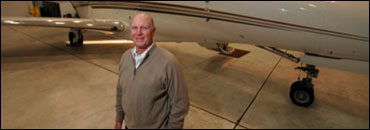 |
|||||
|
Cornered: Larry Kelley Timing is everything, and no one knows it better than Larry Kelley, the developer who led the privatization of the McClellan Air Force Base, considered one of the biggest redevelopment projects in Sacramento history. A team of private developers bought the place from the county in late 2001 and vowed to turn it into an industrial/commercial park, with thousands of new homes. Unfortunately, accumulated toxic waste from Air Force operations has been a big problem, affecting plans to build new homes. But the commercial end of things finally is booming. And one big reason is growth from an unexpected direction: the private-jet services business. Since starting McClellan Jet Services LLC five years ago, as the Air Force made its exodus, Kelley has seen the corporate-jet market at the former military baseimprove in the wake of the 9/11 attacks. The McClellan hangars recently underwent a $1.5 million upgrade, in a joint project of Kelley’s McClellan Park and Sacramento County, each make improvements. McClellan attracts about 100 aircraft a week for refueling, parking and maintenance, says McClellan Jet Services manager Scott Owen, a rate of activity that he estimates “is considerably up from a yeamillion gallons of jet fuel at the airport, where it operates 24 hours a day, seven days a week. Because the facility was formerly an Air Force base, there is plenty of hangar space available — 1.5 million square feet. So far, 40 percent of the airfield side is leased, says Owen, adding that over the past leases go.” Deals are in the works to fill another 20 percent, says Kelley. The New Jet Set Not only has Kelley built up a client base of 45 aircraft, but as the private developer of the small-city sized McClellan Park, he has attracted other corporate-aircraft service providers: Flight Options, an Ohio-based fractional jet ownership company, has set up its West Coast maintenance operations here. And XO Aviation, which came in during the past year to lease a hangar after buying Woodland Aviation, is a full-service Raytheon Beechcraft corporate-jet dealership. Its XO Jet division offers maintenance, fractional jet ownerships and charters in the refurbished Hangar 690. XO Jet emabout 15 and has as many as 10 aircraft housed in the hangar. “(XO Jet has) more Citation 10s than anybody,” says Kelley, referring to the popular and sleek corporate jets. “And they have orders for 10 or 12 more this year.” Meanwhile, the backdrop for all this is a resurgent corporateaviation industry. It gained momentum after 9/11 when private-jet travel became the most efficient way for business executives to get around the country, gitravel. To meet those demands, corporate-jet manufacturers are taking orders for private jets of all sizes, including the popular “microjets,” which seat four to six and have 1,000 nautical miles of range. Another growing area of demand is the emerging jet-taxi ride to a far-off city. The third new trend is for companies, or even countries, to buy their own new jumbo jets, such as Boeing 747s or 757s or Airbuses, for use by CEOs or heads of state. Five or six years ago, the biggest jets sold to big companies were Boeing 727s. At a recent industry trade show in Orlando, Fla., Owens saw corporate orders placed for 13 big jets, and that startled him. “Those are monstrous airplanes,” he says. But their huge size isn’t a drawback at McClellan, whose runway, built to handle B-1 bombers back in the day, is long enough at 10,600 feet to accommodate the biggest jets. And as Sacramento grows, adding more national retail and restaurant chains, corporate air traffic business to McClellan, Mathetheir local operations. The 3,000-acre McClellan Park, meanwhile, is well on its way to leasing out its 8.3 million square feet of office and industrial space. Five years ago, leasing that much space looked daunting, and predictions were that it would likely take a decade to fully lease. But in five years, nearly 5 million square feet have been leased to tenants employing 10,000 people — double the work force since the park opened. McClellan Park is a joint venture of Morgan Stanley Real Estate Fund, Stuart Lichter of Industrial Real Estate Group and Kelley Properties. Under the agreementundisclosed sum. Among the biggest current tenants are Northrop Grumman, Buetler Corp.’s headquarters for its heating and air conditioning business, SureWest Communications’ broadband data center, the U.S. Dept. of Agriculture forest fighter training center, Sacramento Container and JCPenney’s 400-employee operation making drapes and cornices. Smaller tenants include Caltrans, which uses its space for training; AAR-ATICs Inc., a defense contractor that makes shelters for the military; Fidelity National Information Services Inc., a financial transaction processor; Sears; the Lions Gate Hotel, and a new $7 million California Aerospace Museum. Next year, Sacramento Regional Transit will occupy maintenance operation. “We’ve got a little of everything,” says Kelley. What a Dump One not-so-small obstacle to leasing McClellan property is the $3 billion worth of toxic cleanup needed for dirt and groundwater polluted by the Air Force over the course of 60 years. It is a task that five years ago was expected to take 35 years. So far, only an estimated 10 percent of the polluted property has been cleaned up by the Air Force. Kelleythe base privatized is the best way to keep cleanup efforts moving forward. Clean-up aside, Kelley is optimistic about the mixed-use development potential for another 4.5 million square feet of land for dustrial, residential, office and retail development. He sees the park as particularly well-suited for state government offices. He can envision aproperty. “We have our own ZIP code, 95652. We should turn it into a TV show.”
---- |
||||
